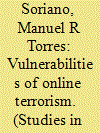| Srl | Item |
| 1 |
ID:
112610


|
|
|
|
|
| Publication |
2012.
|
| Summary/Abstract |
This article contributes toward the growing literature on social network analysis and terrorism studies through an examination of the Australian neo-jihadist network. The focus is on measuring how large the Australian neo-jihadist network is and uncovering how connected individuals within the network are. A detailed social network analysis of the Melbourne cell arrested in 2005 under Operation Pendennis is then undertaken. The study primarily uses Listening Device and Telephone Intercept transcripts to analyze how the cell was structured, operated, and how individuals within the group interacted. It is hoped that this work will contribute toward a more detailed understanding of the neo-jihadist phenomenon in Australia.
|
|
|
|
|
|
|
|
|
|
|
|
|
|
|
|
| 2 |
ID:
112611


|
|
|
|
|
| Publication |
2012.
|
| Summary/Abstract |
Interpretations and uses of Islam are legion today. Some call for improving or preserving the morals and dignity of a certain local Muslim community or of the global Muslim community (umma) in its entirety. Others are eager to demonstrate that Islam is fully compatible and, in fact, conducive to modernity, democratic governance, and technological advancement of humankind. Still others posit Islam as a powerful means of liberation from occupation and domination/exploitation of Muslims around the world by non-Muslim powers. 1
This article addresses one concrete example of how some Muslim insurgents of the Northern Caucasus use Islam to unite the diverse and occasionally mutually hostile ethnic groups of the area in the face of Russian domination with the goal of establishing an independent Islamic state based on the Muslim Divine Law (Sharia). After providing a general overview of the history and ideology of this Islamic/Islamist movement, the article focuses on the ways in which its leadership uses the Internet to disseminate its understanding of Islam and to rally young Muslims round the idea of the trans-ethnic Sharia state that they promise to institute after defeating and expelling "the Russian occupiers" and their local backers. Special attention will be given to the role of Islamic concepts and taxonomies as well as the Arabic language in framing the political grammar of the insurgency movement known as "The Caucasus Emirate.
|
|
|
|
|
|
|
|
|
|
|
|
|
|
|
|
| 3 |
ID:
112609


|
|
|
|
|
| Publication |
2012.
|
| Summary/Abstract |
Are the mechanisms and processes that lead to radicalization different for Muslim converts and non-converts in the United States? While many scholars attempt to explain why people violently radicalize, the theories are diverse and most treat converts and non-converts the same. This study answers this question by categorizing the many radicalization theories into three levels of analysis so that cases of radicalization can be analyzed across and within disciplines. Out of 83 cases studies, individual-level factors are more prevalent among converts than non-converts. Group-level processes similarly affect both groups. Mass-level mechanisms are not significant factors in radicalization.
|
|
|
|
|
|
|
|
|
|
|
|
|
|
|
|
| 4 |
ID:
112608


|
|
|
|
|
| Publication |
2012.
|
| Summary/Abstract |
Jihadist terrorism has discovered in the Internet a valuable instrument to strengthen its activities. However, in using this technology the terrorists are exposed to new vulnerabilities. The Internet plays a leveling role: each new advantageous use it brings is accompanied by a new opportunity to weaken terrorist groups. The present article examines the main vulnerabilities of radical groups who have accorded the Internet a central role in their strategy, namely, less anonymity and security, a loss of content visibility, a major credibility problem, and an undermining of the legitimacy of the terrorist discourse as a consequence of their use of Web 2.0.
|
|
|
|
|
|
|
|
|
|
|
|
|
|
|
|